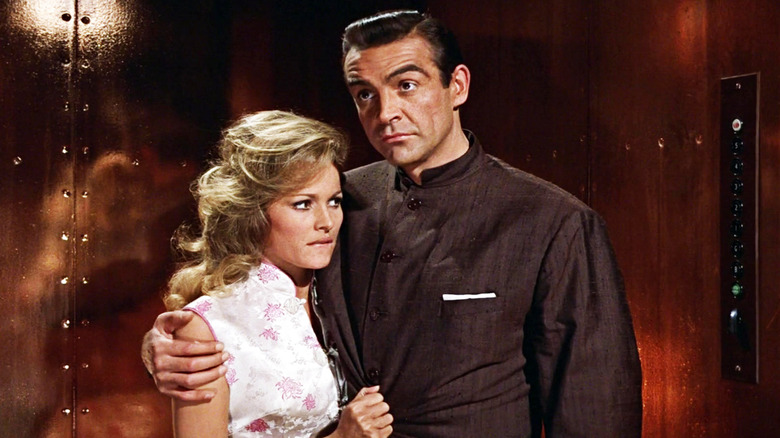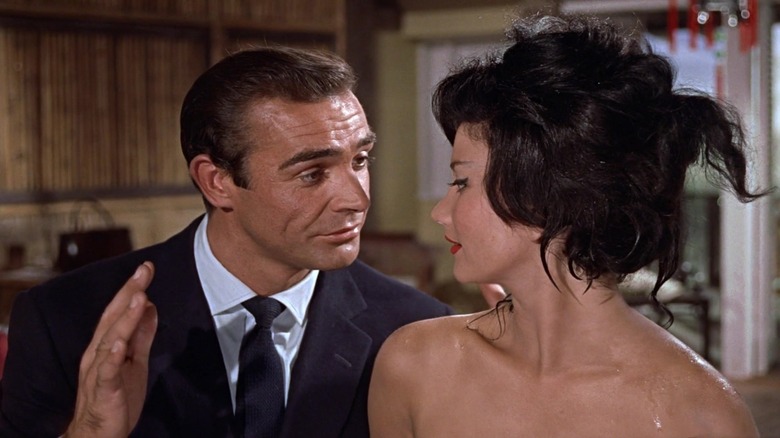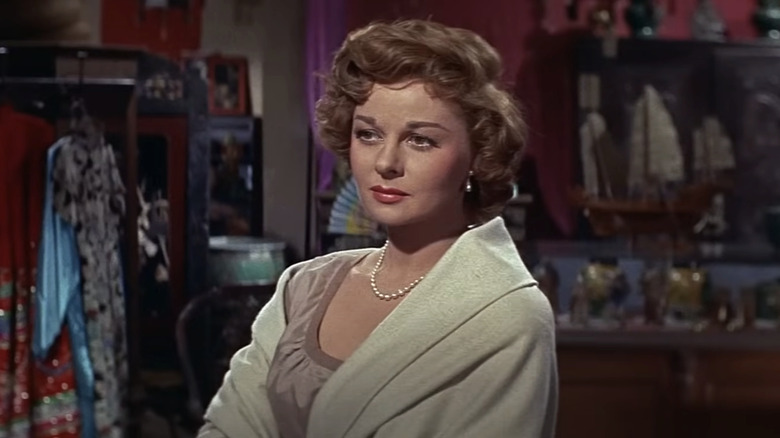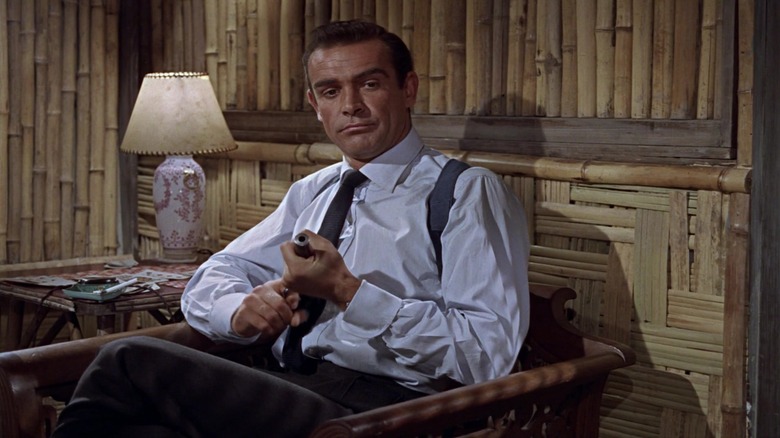A Female James Bond Could've Happened – Way Back In The 60s
With Daniel Craig bowing out after his James Bond was blasted into the afterlife at the end of 2023's "No Time to Die," the question of who will take on the iconic role next has been following the franchise for quite some time. In 2024, as our cultural norms shift and evolve, there's no reason why the super spy couldn't be played by anybody — maybe even, dare I suggest, a woman?
Prior to the release of "No Time to Die," the internet was abuzz with rumors that British actress Lashana Lynch would be the next 007. When the film arrived, it was revealed that Lynch's character, Nomi, did indeed inherit the codename from her predecessor. Later in the film, however, she requests that the title be given back to Bond, after which she takes on the codename 005. So, we didn't get a female Bond, but we sort of did for a minute ... then we didn't again. Now, Nomi almost certainly won't return, as Eon Productions and longtime franchise producers Barbara Broccoli and Michael G. Wilson look to reboot their saga — though Lynch has said she'd love to play her character again.
This makes the whole Nomi situation a very non-committal way of addressing the question of whether Bond could be female — a question that has been conspicuously haunting the franchise in recent years. There have been all sorts of opinions cropping up about how best to address women in the Bond franchise generally. But it seems this isn't a new conversation by any means. In fact, before Bond ever debuted on the big screen, there was a brief moment where the character could have been played by a woman.
Casting the first James Bond was a major challenge
The inaugural Bond outing, 1962's "Dr. No," famously starred Sean Connery, who delivered a performance that has come to define James Bond in our collective perception of the character. Connery's portrayal helped kick off cinema's most enduring franchise, with the Scot portraying the titular spy as wryly confident and sophisticated. Much of that came directly from director Terrence Young, who happened to be enough of a bon vivant that he helped imbue Connery's Bond with the kind of refinement the Scottish actor's working-class upbringing didn't necessarily provide. This is perhaps why original Bond author Ian Fleming wasn't all that impressed with Connery upon their first meeting.
As IndieWire reports, Nicholas Shakespeare's new biography of Fleming, "Ian Fleming: The Complete Man," reveals the writer actually found Connery to be a bit of a brute after meeting him for the first time. Fleming's film agent, Robert Fenn, told Shakespeare that his client was, "shocked because [Connery] couldn't speak the Queen's English," adding, "Fleming said, 'He's not my idea of Bond at all, I just want an elegant man, not this roughneck.'"
It's an odd confession, considering Fleming's books described 007 as a "blunt instrument" and it's well known among Bond fans that Connery and the early films helped define the character as the more "elegant" spy we all know. But when Fleming first met Connery, Young had yet to mold the young actor into the figure of cool sophistication that debuted in "Dr. No," and for whatever reason Fleming wasn't impressed. But then, no one behind the scenes of the first Bond film was all that impressed — with anyone.
The first James Bond could have been Susan Hayward
Lashana Lynch may have officially become the first woman to bear the 007 monicker, but it seems things could have looked much different in that regard. Prior to Sean Connery's casting in "Dr. No," the producers considered a bewildering array of actors for the role, even before "Dr. No" was confirmed as the first novel to be adapted. As Robert Fenn revealed in "Ian Fleming: The Complete Man," "We tried twenty or thirty [actors]. No major actor would play the part for more than one picture, and we couldn't set up a deal with a distributor without commitment from a main actor." Amidst this casting debacle, several options were considered. As Nicholas Shakespeare writes:
"Since the mid-1950s, many well-known actors had been approached [...] Ian [Fleming] had entertained several possibilities, from Richard Burton ('I think that Richard Burton would be by far the best James Bond'), to James Stewart ('I wouldn't at all mind him as Bond if he can slightly anglicise his accent'), to James Mason ('We might have to settle for him')."
But according to Shakespeare, there was one suggestion among these that was, at the time, surprisingly progressive. The author writes that producer and then co-owner of the Bond screen rights, Gregory Ratoff, "had the arresting idea of having Bond played by a woman, Susan Hayward."
Ratoff passed away in 1960, but in 1955 had purchased the rights to adapt Fleming's novel "Casino Royale." It was during the time the Russian producer was trying to get his adaptation made, that he floated the idea of Hayward in the lead role.
Will we ever get a female Bond?
Before her passing in 1975, Susan Hayward had built an impressive acting career, winning an Oscar for her portrayal of Barbara Graham in 1958's "I Want to Live!" and being nominated a further four times for various other roles. In 1955, the year Gregory Ratoff purchased the rights to adapt "Casino Royale," Hayward starred alongside Clark Gable in "Soldier of Fortune," and was hitting the height of her career. You can see why then Ratoff threw her name in the ring for Bond. If he was going to consider a woman to play the title role, Hayward was one of the best options.
Alas, we didn't get a female Bond in the '50s, and we still haven't had one in 2024. In 2020, Bond producer Barbara Broccoli stated that 007 would always be a male character, which followed her previous 2018 comment to The Guardian that Bond "was written as a male and I think he'll probably stay as a male." In the age when Hollywood is obsessed with multiverses, spin-offs, and new ways to tell the same story, however, it does seem odd we haven't yet had an alternate 007 timeline featuring a female star. But then, Broccoli and fellow producer Michael G. Wilson are famously protective of the Bond IP.
As such, you probably won't see too much tinkering with the 007 franchise formula, let alone the grand overhaul that would be required to make Bond a woman. Still, "No Time to Die" wasn't exactly a testament to Broccoli and Wilson's talent for shepherding quality Bond products to market. Neither was that 007-themed game show that inexplicably starred Brian Cox. So, maybe whoever gets ahold of the rights next will finally deliver a female Bond and make Greg Ratoff proud.



